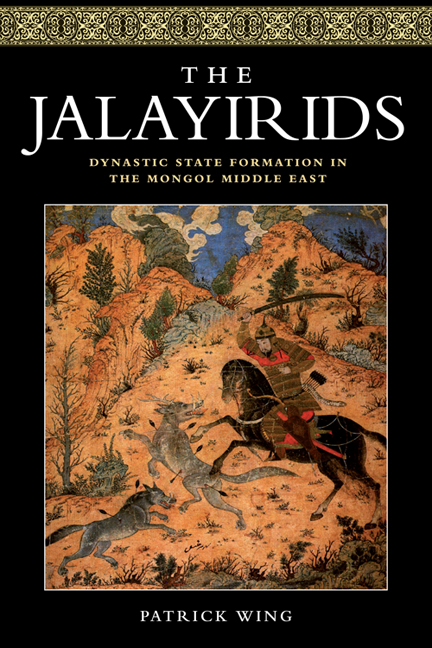Book contents
- Frontmatter
- Contents
- List of Illustrations
- Acknowledgements
- Abbreviations for Primary and Secondary Source Texts
- 1 Introduction and Sources for the History of the Jalayirids
- 2 Tribes and the Chinggisid Empire
- 3 The Jalayirs and the Early Ilkhanate
- 4 From Tribal Amirs to Royal In-laws
- 5 Crisis and Transition (1335–56)
- 6 Shaykh Uvays and the Jalayirid Dynasty
- 7 Dynastic Ideology during the Reign of Shaykh Uvays
- 8 Challenges to the Jalayirid Order
- 9 Conclusions and the Legacy of the Jalayirids
- Maps and Genealogical Chart
- Bibliography
- Index
7 - Dynastic Ideology during the Reign of Shaykh Uvays
- Frontmatter
- Contents
- List of Illustrations
- Acknowledgements
- Abbreviations for Primary and Secondary Source Texts
- 1 Introduction and Sources for the History of the Jalayirids
- 2 Tribes and the Chinggisid Empire
- 3 The Jalayirs and the Early Ilkhanate
- 4 From Tribal Amirs to Royal In-laws
- 5 Crisis and Transition (1335–56)
- 6 Shaykh Uvays and the Jalayirid Dynasty
- 7 Dynastic Ideology during the Reign of Shaykh Uvays
- 8 Challenges to the Jalayirid Order
- 9 Conclusions and the Legacy of the Jalayirids
- Maps and Genealogical Chart
- Bibliography
- Index
Summary
By 1360, Sultan Shaykh Uvays had taken control of Azarbayjan, the first step in consolidating Jalayirid rule over the lands of the western Ilkhanate. In addition to this military conquest, and the consolidation of authority as described in the previous chapter, the ideological foundations of the Jalayirid sultanate were elaborated during the reign of Shaykh Uvays. In this period, the servants and supporters of Shaykh Uvays created a complex narrative and official image of the Jalayirid dynasty as the rightful successors to the Ilkhanids. Unlike previous Chubanid amirs like Malik Ashraf, as well as Shaykh Ḥasan Jalayir, who had ruled in the name of figurehead khans, Shaykh Uvays claimed a number of royal titles for himself, including sultan, khan and ṣāḥib-qirān (lord of the auspicious conjunction). This ideological programme was created by individuals who relied on the Jalayirid court for their livelihood, and had also served the Ilkhanids and had a professional interest in the continuation of the Ilkhanid political order. They stood to benefit from a royal patron who ruled from the wealthy province of Azarbayjan and who patronised the urban literate religious and administrative culture in Tabriz. This chapter explores some of the major aspects of Mongol imperial, Ilkhanid and Perso-Islamic ideologies of legitimate rulership that came to be incorporated into works of history, administrative protocol, poetry, architecture and art during the reign of Shaykh Uvays. What we find is an ideology of legitimate rulership that looked to the Ilkhanid past while at the same time acknowledging the unique nature of the Jalayirid sultan's identity as the ideal upholder of the values of the steppe, justice and Islam.
Shaykh Uvays as Heir to the Ilkhanate
An important aspect of the political identity of Shaykh Uvays as presented by individuals in the service of the Jalayirid court was the close connection of his family to the Ilkhans. An attempt to present Shaykh Uvays as the legitimate heir to the Ilkhanid dynastic tradition is found in the only surviving work of history written for and about the Jalayirid dynasty, the Tārīkh-iShaykh Uvays, completed around 761/1360 by Abū Bakr al-Quṭbī al-Ahrī.
- Type
- Chapter
- Information
- The JalayiridsDynastic State Formation in the Mongol Middle East, pp. 129 - 146Publisher: Edinburgh University PressPrint publication year: 2016



